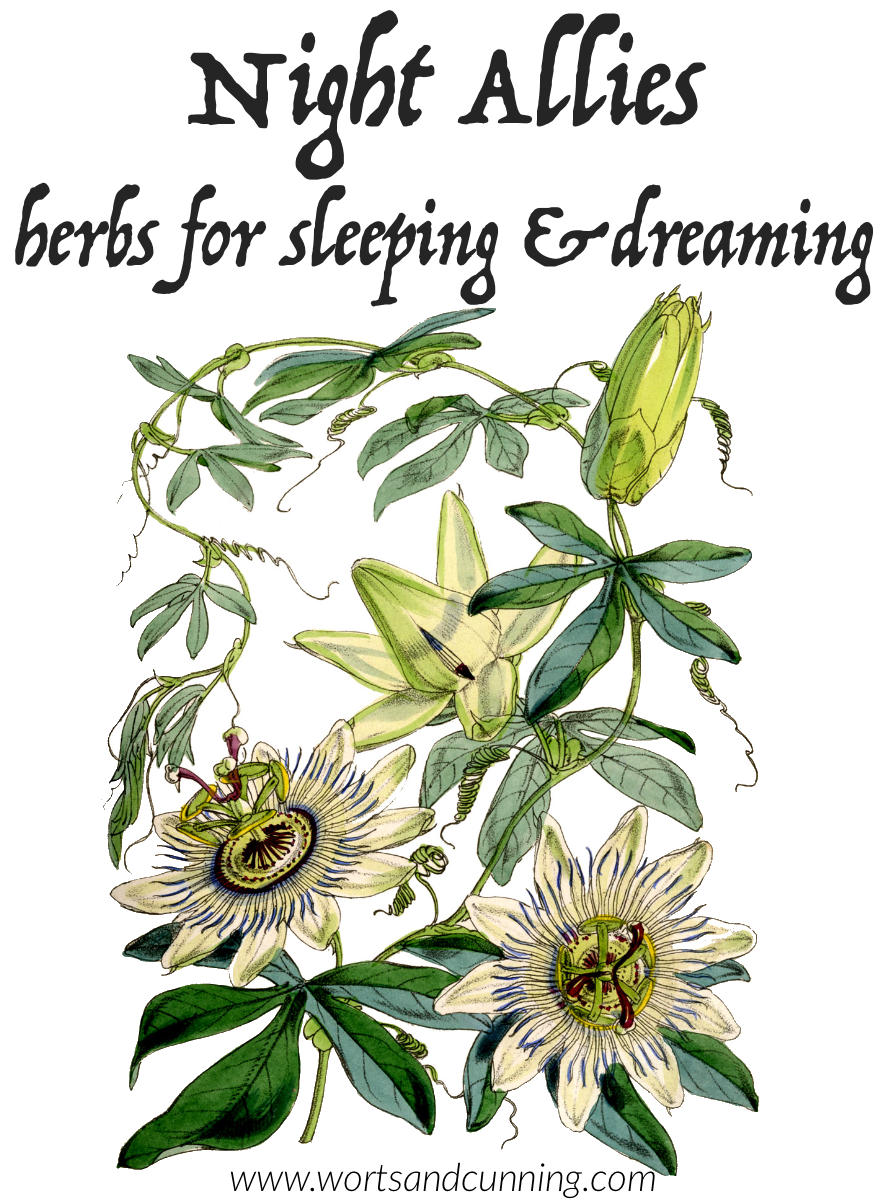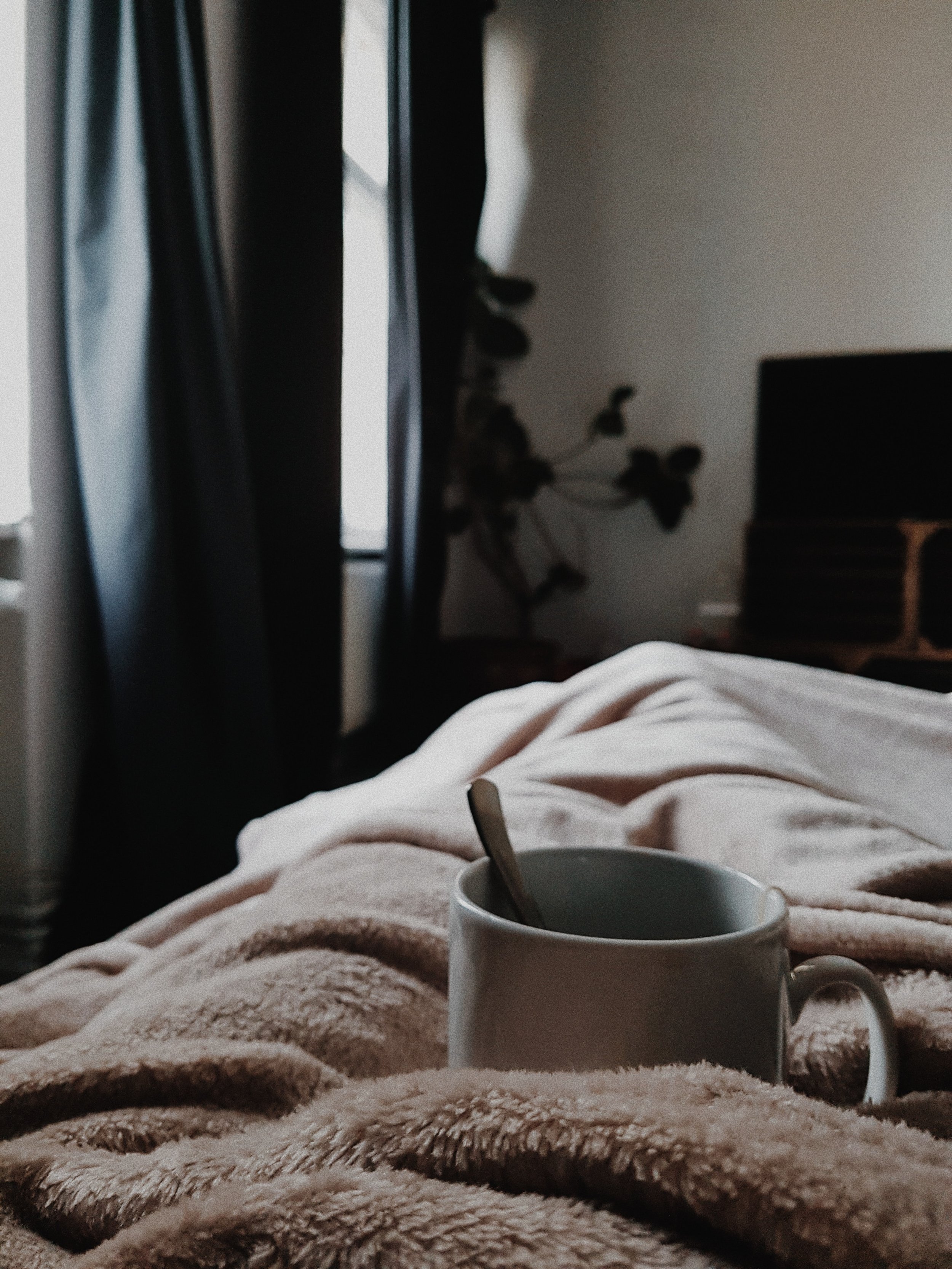Night Allies: Herbs for Sleeping and Dreaming
There's plenty of advice out there on how to get better sleep, solve insomnia, and become a level 54 lucid dreamer. While I'm not going to repeat a lot of what is useful (reducing caffeine and alcohol intake, unplugging before bedtime, getting yourself into therapy, and participating in the sudden onset of world peace that alleviates our collective existential anxiety), I do want to look at the ways that herbs can support our sleeping and dreaming practice. I'll highlight some common sleep complaints and then share with you some of my favorite relaxing and gently sedating herbs in a way that might help you find a plant ally to work with.
There are a lot of reasons that our sleep gets disrupted, some of which is in our control (choosing to turn off our phone instead of scrolling before bed) and some of which is less so (stopping your neighbor from throwing logs in the back of their truck outside your bedroom window every morning at 5 AM). Hormonal changes, aging, autoimmune illnesses, thyroid conditions, seasonal allergies, physical injury, changes in the weather, and so on can lead to restlessness, insomnia, and difficulty accessing deep states of rest. It's also important to remember that any herbs that we incorporate into our healing work for sleep are best used in conjunction with other practices, a few which I'll mention below. For our purposes, I'll be focusing on herbs that help to support our nervous system and emotional health which in turn can help to address many varieties of sleep issues and bring us easier nights.
Our journey to better nights, however, begins in the morning.
Good Mornings for Good Nights
When we've fallen out of rhythm with our nights, starting our days with supportive plants can be very useful. I generally recommend a daily routine of nervines such as Lemon Balm (Melissa officinalis), Milky Oat (Avena sativa), Chamomile (Matricaria chamomilla), and/or Rose (Rosa spp.) as one of the first things ingested upon waking up. Beyond exhaustion, restlessness and insomnia can heighten stress and anxiety in our lives. By beginning with gentle nervines that help to relax tension and alleviate stress, we are practicing being restful throughout our day, guiding us to a place of deeper rest and sleep as night comes on.
Below I've listed some feelings focused key indications for some of my favorite relaxing nervines - these are just starting points and it's important to follow up with more research, including contraindications, or working with an herbalist to find the best plants for your needs. As stress can be an underlying symptom of many sleep issues, these herbs can help us to release physical, emotional, and mental tension while inviting in relaxation.
If you're feeling burnt out and like your nerves are frayed Milky Oat (Avena sativa) might be a good ally to work with.
If you're struggling with the pressures of social technologies, of missing out, and a general sense of anxiety, consider Lemon Balm (Melissa officinalis).
If you're feeling cranky and out of sorts, your digestion is struggling, and/or you are struggling with feeling emotionally regulated, Chamomile (Matricaria chamomilla) might be a good option.
If you're feeling spiritually restless, tenderhearted, perhaps even dealing with issues of grief and loss, Rose (Rosa spp.) or Hawthorn (Crataegus monogyna) can be a beautiful allies to connect with. These are good plant allies for boundary-setting, too, in your sleep practice with yourself and others.
If you're really struggling with feelings of anger and frustration and like you could really use a compassionate parent in your life, Motherwort (Leonurus cardiaca) might be the friend you need.
In addition to starting your day with helpful herbs, you might consider incorporating breathwork or meditation into your morning practice. A few minutes of breathwork here and there throughout the day is another way that we remind our body that we know how to become restful, especially at low stakes moments (i.e. not only using breathwork at the time when you're trying to fall asleep, but practicing breathwork when there is no goal of sleep immediately ahead of you).
Winding Down and Settling In
As the day gives way to night, it's time to help our body find its restful rhythms. Much of my practice of herbalism is woven together with the idea of homecoming. To invite ourselves home to a feeling of peace and resiliency, of restoration and homeostasis is about creating an environment within and around us that supports our unique needs. Of course, this process of creating an environment where we thrive is not just an individual project, but as with all healing work, is about how we are part of our surroundings, including our community in whatever forms it takes. In other words, take care of what you can manage on your own and get help with everything else (which is going to be, appropriately, a lot because we are a social species meant to rely on one another).
Working with herbal remedies in the evening is a signal to our body to begin to ebb and settle after a long day of extension and flow. Any ritual we have, whether preparing a cup of evening tea, changing into our pajamas, bathing, and so on, can act like a doorway and sacred boundary between one aspect of our life into another. With sleep-supporting herbs we are inviting ourselves to cross from a space of waking and doing to one of resting and returning.
For a general end-of-day restorative tonic that helps us transition from waking to sleeping, Ashwagandha (Withania somnifera) is one of my favorite plant allies to recommend.
If you struggle with overwork and excess expectation of what you should be doing, struggling to just be and rest, Blue Vervain (Verbena hastata) may be a good ally.
If your thoughts are busy and racing, waking you up as you feel like you're on the edge of sleep, you might begin and end your day with Skullcap (Scutellaria lateriflora).
If you struggle to fall asleep and are prone to anxious, looping thoughts, you might want to work with Passionflower (Passiflora incarnata).
For general restlessness accompanied by tension and a disposition towards excitability, consider Hops (Humulus lupulus).
If you can fall asleep but struggle to stay asleep and consider yourself a light sleeper, and/or if you've tried Passionflower (Passiflora incarnata) without success, California Poppy (Eschscholzia californica) might be a good ally for you.
I often like to imagine that our sleeping self is something we call home to ourselves every evening. Sometimes our sleeping self gets lost or confused as to where it's supposed to be - sometimes our sleeping self has the energy of a toddler going through a sleep regression. While you're seeking ways to support healthy sleep habits in your life, it can be a useful exercise to take a moment to imagine your sleeping self, what that part of you feels like and needs, and the waymarkers and environment it needs to come back home to your waking self. You might ask yourself questions like:
What helps me feel not only relaxed but safe to be vulnerable?
What parts of my sleeping self do I struggle with (i.e. taking "too much" time to sleep is "selfish" or I'm not being "productive" when I rest and sleep)?
What are some of my most cherished memories of sleep and rest?
Alongside these more internal searchings for sleep, make sure to address the practical solutions, too. Get those earplugs, turn off the screens, create your sleeping rituals, and be patient and loving with yourself as your sleeping self finds its way home to you.
The Dreaming Self
Along with supporting our sleeping body, herbs can be wonderful allies in supporting our dreaming self. Supporting the dreaming self isn't about being able to remember our dreams or become lucid dreamers, though both those aspects of dreamwork can be aided by plant allies, but I think of dreaming herbs as serving nourishing the bridges between our nervous system and the collective nervous system. Nourishing our dreaming body is to tend to the intangible connections we have with other people and places, memories and futuredreamings. Many of the herbs I've already written about in this post support the dreaming body (Melissa officinalis, for example, is one of my favorite dreaming herbs for adults and children when it comes to helping the dreaming body explore freely without the stress of the waking body, Passiflora incarnata can help us have more vivid dreams, and so on), but there are a few more I want to mention.
For general dream health, Mugwort (Artemisia officinalis) is a long-trusted plant ally, helping us to sleep deeply so we can dream deeply, protecting us from nightmares, and assisting us in connecting to our intuition as we sleep. While Artemisia officinalis is often recommended, I love working with local Artemisia varieties (like A. californica) and if you have a safe one that is local to where you live, consider working with that in conjunction or in place of A. officinalis.
If you struggle with indigestion in the evenings and suffer with nightmares, digestive herbs like Chamomile (Matricaria chamomilla) can be a good option.
If your dreams are anxious and stressful, Ashwagandha (Withania somnifera) might offer relief.
For those interested in a plant ally to support your lucid dreaming practice, Mucuna (Mucuna puriens) might be a good ally for you.
What About Valerian?
If you've been reading about herbs for sleep, you've probably come across Valerian (Valeriana officinalis). Valerian is a lovely anxiolytic herb and for some folks it is an excellent choice for helping relax the body into a state of deep sleep. It's also an herb that is sedating without the addictive quality that other allopathic sedatives can have.
For many years, I recommended Valerian without hesitancy to my clients. But I started to notice that a number of them were experiencing the opposite of what was supposed to happen with Valerian. Instead of a feeling of restfulness and gentle sedation, they were experiencing restlessness and agitation. Many herbalists have observed similar experiences with Valerian amongst some of their clients. Different herbalists have theories as to why this might be - in my own observation I think it's a mix of physiological reaction in the body (i.e. in the same way a percentage of the population becomes drowsy with caffeine, some folks become agitated with Valerian) and an emotional response to moving into a state of relaxation and deep rest which doesn't feel safe to everyone, especially if there is a history of trauma involved. Valerian, while gentle, is one of the more powerful herbs in the traditional western herbalism materia medica and I've also observed that highly sensitive folks, a population that I work with often, can sometimes feel overstimulated rather than relaxed by Valerian. Yet, there are plenty of highly sensitive folks for whom Valerian is a beloved ally.
So should you work with Valerian? Valerian is an herb that can be really great for many folks, but agitating for others. It can be disorienting to work with an herb thinking that it is going to be relaxing but then find yourself in a state of restlessness instead of sleepfulness, so I try to recommend it carefully. If you want to start working with Valerian, I recommend starting with small doses such as 5 to 10 drops of tincture once before bed or a very mild tea of a ½ teaspoon or less per 8 ounces of water. You can always work with an herbalist one-on-one to help you find the best herbs to support your sleep rhythms.
Preparing Remedies
My favorite way to prepare herbal remedies, especially when we are seeking to restore balance to our nervous system and bodily rhythms, is to make a tea of them (i.e. one heaping teaspoon of herbs to eight ounces of water and steeped for 15 - 20 minutes). The process of making and drinking tea can be an invitation to mindfulness and is a way to engage all of our senses in the experience of making and taking a remedy. Other forms of herbal remedy that work well in supporting the resting body are herbal baths and showers as well as herbal oils (i.e. whole herb oil infusions). Of course, you can use the form of remedy that makes most sense for you and the herb being prepared, such as tinctures or glycerite, so feel free to find the type of remedy that works best for you and your rhythms.
I've created a simple one-page guide to making different types of herbal remedies (i.e. the different proportions and preparation techniques between an infusion or decoction and so on) for everyone who signed-up for my infrequent but intentional newsletter if you're interested in incorporating healing herbs into your sleep practice.
✨
Sleep is such a precious thing and so vital to our health that it can cause a lot of despair when it's disrupted. I hope that you've found some inspiration for supporting your own sleep practice and that you're feeling encouraged to ask for help and seek out further resources. If you're interested in a lunar healing perspective on rest, come this way.
May rest be an ally, sleep a beloved companion, both easy to find whenever you need them.
This post was made possible through patron support.
❤︎ Thank you, friends. ❤︎









